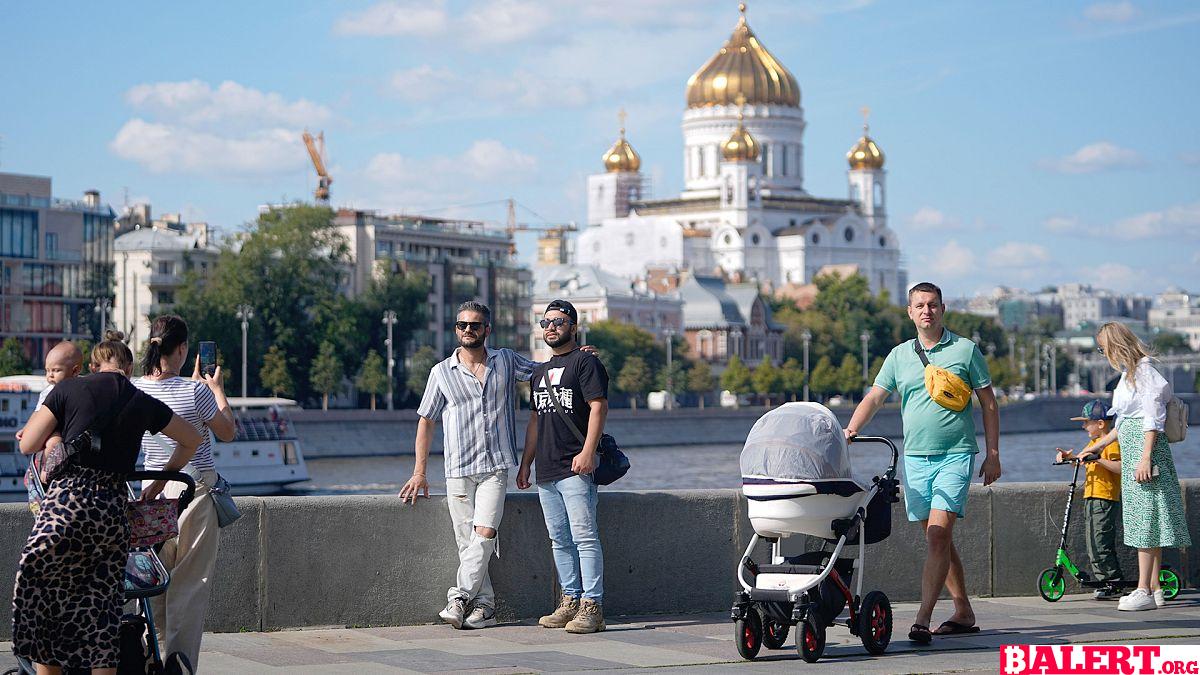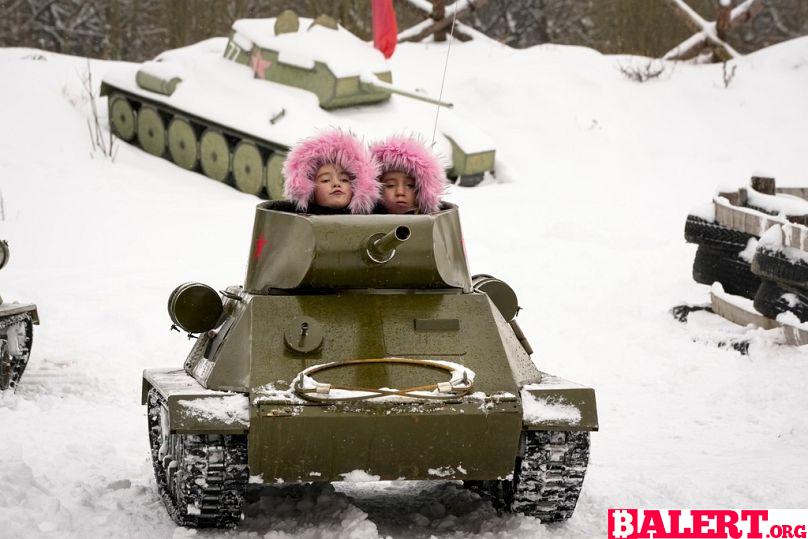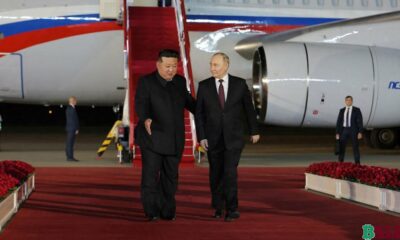World
Russia Faces Demographic Crisis as Birth Rate Hits Lowest Level Since 1999
Explore the implications of Russia’s alarming demographic crisis as birth rates plunge to their lowest since 1999. This article delves into the causes, consequences, and potential solutions to a challenge that could shape the nation’s future.

Russia’s Birth Rate Crisis: A Deepening Concern
Russia is currently grappling with a significant demographic crisis, as evidenced by the alarming drop in its birth rate, which has plummeted to its lowest level since 1999. In June 2024, the number of live births fell below 100,000, raising serious alarms within Moscow about what many are describing as a critical population decline. According to data released by Rosstat, Russia’s governmental statistics agency, from January to June 2024, there were 599,600 births, which marks a decline of 16,000 compared to the same timeframe in 2023.
Compounding this issue, Russia’s population decline has accelerated by 18% during the same period, with an additional 49,000 deaths recorded in 2024 compared to the previous year. This increase in mortality is believed to be largely influenced by the ongoing casualties resulting from Russia’s full-scale invasion of Ukraine.
Nina Ostanina, the head of the State Duma Committee for Family Protection, highlighted the urgency of the situation, stating that a “special demographic operation” is necessary to stimulate the birth rate. This terminology reflects the government’s acknowledgment of the demographic challenges exacerbated by the conflict in Ukraine.
The Ongoing Population Challenge

Russia’s population has been on a downward trajectory since the 1990s, with only brief periods of recovery. For context, the birth rate in 1999 was recorded at 1.6, a figure lower than during the devastating years of World War II. Since Vladimir Putin assumed the presidency, he has repeatedly emphasized the importance of enhancing the birth rate as a key priority for the nation.
The Kremlin has often romanticized the notion of young motherhood, with Putin framing it as part of Russia’s “historic duty” in 2020. In response to the demographic crisis, the government implemented a series of family-oriented policies, including:
- Expanding paid childcare services for low-income families.
- Introducing tax incentives for larger families.
- Promising to increase the availability of nursery places.
However, the full-scale invasion of Ukraine has exacerbated these demographic challenges. The conflict has triggered a mass exodus of individuals, including those opposed to Moscow’s policies and young men seeking to avoid conscription, while few newcomers are entering the country.
Alex Kokcharov, a country risk analyst for Eurasia, pointed out that despite the government’s financial incentives, the fertility rate in Russia continues to decline as the war drags on. He noted, “With the war persisting into its third year and directly impacting Russian territory, financial support alone is not sufficient. Families are hesitant to make decisions about having children amidst the prevailing security uncertainties in border regions.”
An Atlantic Council report further underscores the potential long-term implications of the ongoing conflict on Russia’s demographics, suggesting that the war could lead to a reduced population and a shrinking workforce. The report warns that the loss of young Russians in the conflict could significantly alter the future labor market landscape.
In a sobering statement, Russia’s Deputy Prime Minister Dmitry Chernyshenko cautioned local media in June that the country could face a shortfall of up to 2.4 million workers by 2030 if the population decline persists. Notably, he refrained from directly linking this demographic forecast to the ongoing military actions.
Interestingly, Russia’s current birth rate is comparable to that of Germany, which has a moderate birth rate within Europe. This stands in stark contrast to Spain, which has one of the lowest birth rates at 1.16, while France boasts one of the highest at 1.79.
World
Dominique Pelicot Testifies in Harrowing Rape Trial
Join us as Dominique Pelicot courageously testifies in a harrowing rape trial, shedding light on the complexities of trauma and justice. Her powerful story raises crucial questions about the legal system and the importance of support for survivors.

Dominique Pelicot Takes the Stand in Shocking Rape Trial
In a courtroom drama that has captivated France and garnered international attention, Dominique Pelicot, the man at the center of a harrowing rape trial, finally addressed the court. With tears streaming down his face, he recounted how his wife had been instrumental in helping him cope with a tumultuous past marked by trauma. He revealed that he had endured a sexual assault at the tender age of nine while hospitalized, and he also witnessed a gang rape during his teenage years while working as an apprentice electrician on a construction site.
“She didn’t deserve this, I acknowledge that,” Mr. Pelicot stated, his voice barely audible as he struggled to convey his emotions. The gravity of the situation weighed heavily on him, and the courtroom fell silent, straining to catch his every word.
Now 71 years old, Mr. Pelicot faces serious allegations of drugging his wife, Gisèle Pelicot, whom he has been married to for half a century, over a span of nearly ten years. Prosecutors contend that he used drugs to render her comatose, allowing him to rape her repeatedly. Furthermore, authorities allege that he went so far as to invite numerous men into their home, facilitating a nightmarish scenario where they, too, engaged in the assault of his wife.
Overall, 51 men, including Mr. Pelicot, are on trial concurrently, primarily facing charges related to the aggravated rape of Ms. Pelicot. Among them, one individual has already pleaded guilty to similar crimes, admitting to drugging his own wife to assault her and inviting Mr. Pelicot to partake in the horrific act while she was incapacitated.
Mr. Pelicot’s unexpected testimony came after a tumultuous start to the trial. Just a week in, he was stricken with severe health issues that forced him to miss four consecutive days in court. The head judge ultimately decided to postpone proceedings, as Mr. Pelicot was diagnosed with kidney stones, a kidney infection, and prostate complications, adding yet another layer of complexity to this already harrowing case.
World
Meta Bans Russian State Media Outlets from Social Media Platforms
Explore the implications of Meta’s decision to ban Russian state media outlets from its social media platforms. Understand the impact on information dissemination and the ongoing battle against misinformation in the digital landscape.

Meta Imposes Global Ban on Russian State Media Outlets
In a significant move, Meta Platforms, Inc., the parent company of Facebook, has announced the prohibition of Russian state media outlets, including RT (Russia Today) and Rossiya Segodnya, from all its social media platforms. The decision stems from the company’s concerns regarding the deceptive strategies employed by these media organizations to execute covert influence operations across the internet.
Meta made this announcement on Monday, emphasizing that the ban will be enforced worldwide across its various platforms, such as Instagram, WhatsApp, and Threads. The rollout of this ban is expected to take place over the coming days.
Statement from Meta
A spokesperson for Meta elaborated on the decision, stating, “After careful consideration, we have expanded our ongoing enforcement actions against Russian state media outlets. As a result, Rossiya Segodnya, RT, and other affiliated entities are now banned from our applications globally due to their involvement in foreign interference activities.”
For further insights into this development, watch the video in the player above.
World
Trump Recalls Alleged Assassination Attempt While Golfing
Explore Donald Trump’s chilling recollection of an alleged assassination attempt he experienced while enjoying a round of golf. Delve into the tense moments and his reflections on safety, fame, and the unpredictability of public life.

In a recent interview on the social media platform X, Republican presidential nominee Donald Trump recounted a harrowing incident he claims to have experienced while playing golf. Trump described how, during a peaceful Sunday morning round with friends, the tranquility of the day was abruptly shattered by the sound of gunfire in the air.
“It was a beautiful day, everything was just perfect,” Trump reflected. “Then all of a sudden, we heard shots being fired—probably around four or five in total.” He went on to explain that a Secret Service agent was the first to spot the suspect, who was allegedly armed with an AK-47, a powerful assault rifle.
“The agent saw the barrel of the weapon and immediately took action, returning fire at the barrel and aiming in the direction of the bushes,” Trump detailed. “I would have loved to have sunk that last putt, but we decided it was best to leave the scene promptly.”
Trump expressed his gratitude towards the agents and a vigilant civilian who aided in tracking down the suspect, who was eventually apprehended following a high-speed chase.
Suspect Faces Multiple Federal Gun Charges
The FBI has identified the suspect as Ryan Wesley Routh, accusing him of targeting Trump during his time at the golf club in West Palm Beach, Florida. According to an FBI report, Routh had allegedly hidden among the hedges of the golf course for an astonishing 12 hours. Authorities discovered an SKS-style assault rifle, a GoPro camera, and a bag of food at the scene.
The 58-year-old Routh is now facing two serious federal gun charges. If convicted on both counts, he could face a combined maximum sentence of 20 years in prison. Notably, neither of the charges is directly related to an assassination attempt. The first charge pertains to possessing a firearm despite a prior felony conviction, which carries a potential 15-year sentence, a fine of $250,000 (€225,000), and three years of supervised release.
The second charge involves possession of a firearm with an obliterated serial number, which could result in a five-year prison term, the same financial penalties, and also three years of supervised release. As the investigation continues, additional charges could be forthcoming.
While the motive behind Routh’s actions remains unclear, his digital footprint reveals strong political affiliations, particularly concerning issues surrounding Ukraine and China. Routh consistently expressed support for Ukraine across various social media platforms, even claiming to have orchestrated a recruitment scheme for international volunteers aiming to assist Ukraine in its fight against Russia’s invasion. This behavior has been denounced by Ukrainian soldiers and members of the International Legion, who disavowed Routh’s actions and motives.
-

 Business4 months ago
Business4 months agoObituary: Dan Collins
-

 Business3 months ago
Business3 months agoThe Significance of Jackson Hole: A Central Banking Tradition
-

 Gaming5 months ago
Gaming5 months agoMore than a thousand students vowed not to work for Amazon and Google due to the Nimbus Project.
-

 World5 months ago
World5 months agoRussia and North Korea Strengthen Defense Ties
-

 Business5 months ago
Business5 months agoJump Crypto Invests $10 Million in Pro-Crypto PAC
-

 Article5 months ago
Article5 months agoCreative Design Applications Developed with Artificial Intelligence
-

 Tech2 months ago
Tech2 months agoNew Leaks and Features About the Samsung Galaxy S25 Ultra
-

 Gaming5 months ago
Gaming5 months agoThe Inspirational Success Story of Avon’s Founder Who Sold Books Door to Door














